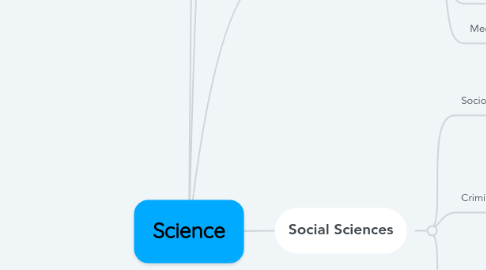
1. Physical Sciences
1.1. Physics
1.1.1. The study of matter and energy and the interactions between them. Physicists study such subjects as gravity, light, and time. Albert Einstein, a famous physicist, developed the Theory of Relativity
1.2. Chemistry
1.3. The science that deals with the composition, properties, reactions, and the structure of matter. The chemist Louis Pasteur, for example, discovered pasteurization, which is the process of heating liquids such as milk and orange juice to kill harmful germs.
1.4. Astronomy
1.4.1. The study of the universe beyond the Earth's atmosphere.
2. Natural Sciences
2.1. Physical science
2.1.1. is a branch of natural science that studies non-living systems, in contrast to life science. It in turn has many branches, each referred to as a "physical science", together called the "physical sciences". However, the term "physical" creates an unintended, somewhat arbitrary distinction, since many branches of physical science also study biological phenomena and branches of chemistry such as organic chemistry.
2.2. Biological science
2.2.1. Biology is a natural science concerned with the study of life and living organisms, including their structure, function, growth, evolution, distribution, identification and taxonomy.[1] Modern biology is a vast and eclectic field, composed of many branches and subdisciplines.[clarification needed] However, despite the broad scope of biology, there are certain unifying concepts within it that consolidate it into single, coherent field. In general, biology recognizes the cell as the basic unit of life, genes as the basic unit of heredity, and evolution as the engine that propels the creation of new species.
3. Biology Sciences
3.1. Botany
3.1.1. The study of plants.
3.2. Zoology
3.2.1. The science that covers animals and animal life.
3.3. Genetics
3.3.1. The study of heredity.
3.4. Medicine
3.4.1. The science of diagnosing, treating, and preventing illness, disease, and injury.
4. Social Sciences
4.1. Sociology
4.1.1. the study of the development, structure, and functioning of human society.
4.2. Criminology
4.2.1. s the scientific study of the nature, extent, management, causes, control, consequences, and prevention of criminal behavior, both on the individual and social levels. Criminology is an interdisciplinary field in both the behavioral and social sciences, drawing especially upon the research of sociologists, psychologists, philosophers, psychiatrists, social anthropologists, as well as scholars of law.
4.3. Anthropology
4.3.1. is the study of humans, past and present. To understand the full sweep and complexity of cultures across all of human history, anthropology draws and builds upon knowledge from the social and biological sciences as well as the humanities and physical sciences.
